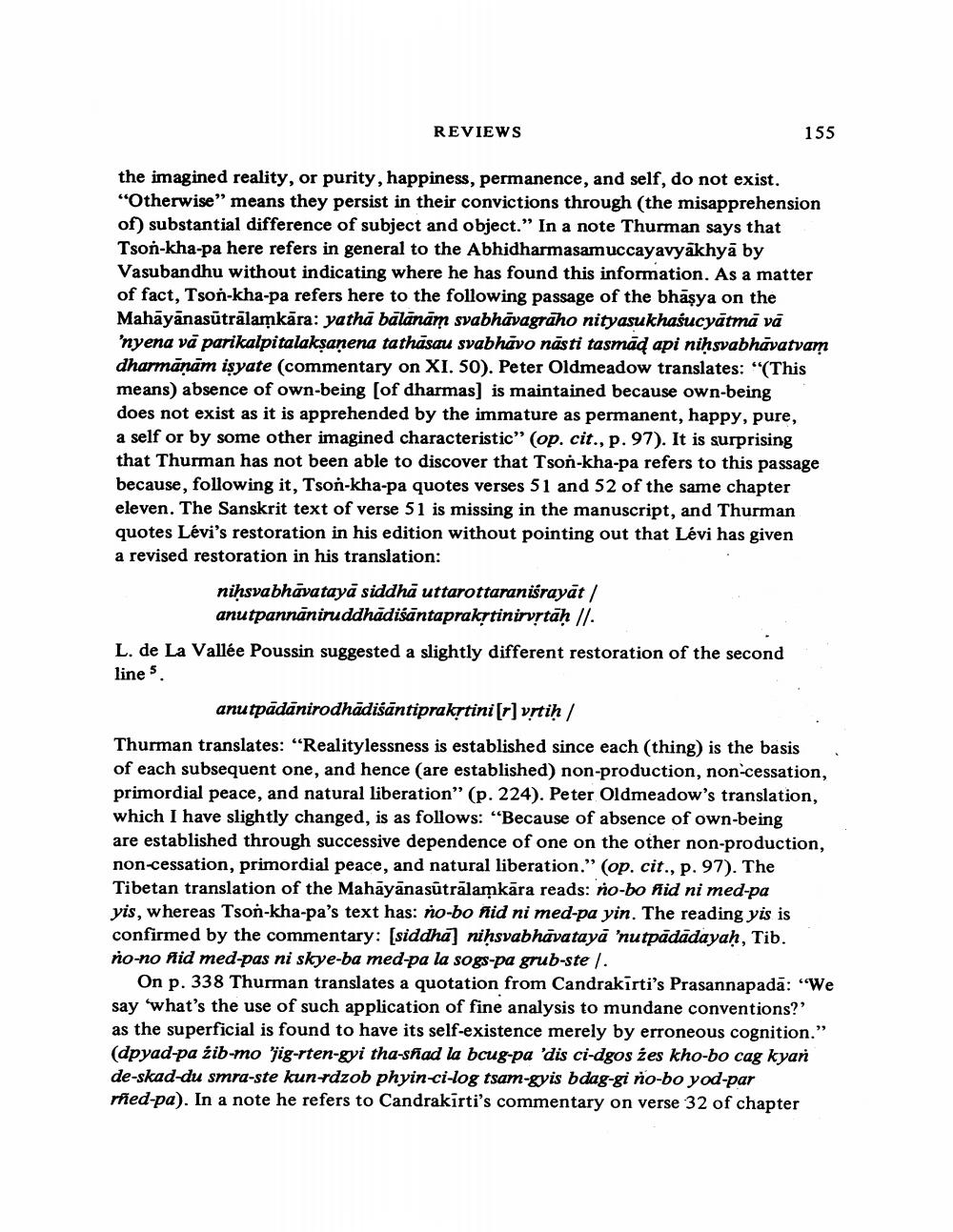________________
REVIEWS
the imagined reality, or purity, happiness, permanence, and self, do not exist. "Otherwise" means they persist in their convictions through (the misapprehension of) substantial difference of subject and object." In a note Thurman says that Tson-kha-pa here refers in general to the Abhidharmasamuccayavyäkhya by Vasubandhu without indicating where he has found this information. As a matter of fact, Tson-kha-pa refers here to the following passage of the bhasya on the Mahāyānasūtrālamkara: yathā bālānām svabhāvagrāho nityasukhaśucyātmā vā 'nyena va parikalpitalakṣaṇena tathasau svabhavo nästi tasmaɖ api niḥsvabhāvatvam dharmāṇām iṣyate (commentary on XI. 50). Peter Oldmeadow translates: "(This means) absence of own-being [of dharmas] is maintained because own-being does not exist as it is apprehended by the immature as permanent, happy, pure, a self or by some other imagined characteristic" (op. cit., p. 97). It is surprising that Thurman has not been able to discover that Tson-kha-pa refers to this passage because, following it, Tson-kha-pa quotes verses 51 and 52 of the same chapter eleven. The Sanskrit text of verse 51 is missing in the manuscript, and Thurman quotes Lévi's restoration in his edition without pointing out that Lévi has given a revised restoration in his translation:
niḥsvabhāvataya siddhä uttarottaranisrayat/ anutpannaniruddhädiśäntaprakṛtinirvṛtāḥ //.
155
L. de La Vallée Poussin suggested a slightly different restoration of the second line 5.
anutpädänirodhädiśäntiprakṛtini[r] vrtiḥ/
Thurman translates: "Realitylessness is established since each (thing) is the basis of each subsequent one, and hence (are established) non-production, non-cessation, primordial peace, and natural liberation" (p. 224). Peter Oldmeadow's translation, which I have slightly changed, is as follows: "Because of absence of own-being are established through successive dependence of one on the other non-production, non-cessation, primordial peace, and natural liberation." (op. cit., p. 97). The Tibetan translation of the Mahāyānasûträlampkära reads: rio-bo fid ni med-pa yis, whereas Tson-kha-pa's text has: no-bo nid ni med-pa yin. The reading yis is confirmed by the commentary: [siddha] niḥsvabhavataya 'nutpadadayaḥ, Tib. no-no Aid med-pas ni skye-ba med-pa la sogs-pa grub-ste.
On p. 338 Thurman translates a quotation from Candrakirti's Prasannapada: "We say 'what's the use of such application of fine analysis to mundane conventions?' as the superficial is found to have its self-existence merely by erroneous cognition." (dpyad-pa žib-mo Jig-rten-gyi tha-shad la beug-pa 'dis ci-dgos žes kho-bo cag kyan de-skad-du smra-ste kun-rdzob phyin-ci-log tsam-gyis bdag-gi no-bo yod-par ried-pa). In a note he refers to Candrakirti's commentary on verse 32 of chapter




